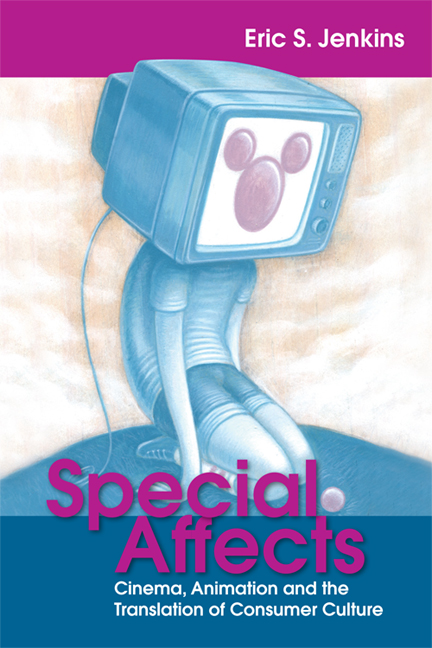Book contents
- Frontmatter
- Contents
- Acknowledgements
- List of Illustrations
- 1 Introduction
- 2 Astonishment and the Fantastic in Live-Action Cinema
- 3 Say Cheese! The Cinematic Lifestyle Consumer
- 4 Animation's Marvel and the Graphic Narrative Mode
- 5 Of Mice and Mimesis: The Wondrous Spark of Disney
- 6 Mutual Affection-Images and Daydreaming Consumers
- 7 The Disney Version of the American Dream
- 8 Walt and Wall-E in Control Society
- Movies Referenced in Special Affects
- Notes
- Index
7 - The Disney Version of the American Dream
Published online by Cambridge University Press: 05 August 2016
- Frontmatter
- Contents
- Acknowledgements
- List of Illustrations
- 1 Introduction
- 2 Astonishment and the Fantastic in Live-Action Cinema
- 3 Say Cheese! The Cinematic Lifestyle Consumer
- 4 Animation's Marvel and the Graphic Narrative Mode
- 5 Of Mice and Mimesis: The Wondrous Spark of Disney
- 6 Mutual Affection-Images and Daydreaming Consumers
- 7 The Disney Version of the American Dream
- 8 Walt and Wall-E in Control Society
- Movies Referenced in Special Affects
- Notes
- Index
Summary
As noted in the Introduction, Massumi and Grossberg each contend that affect is the ‘origin’ of ideology, both the source from which ideology is translated and the reason that ideology sticks or persists. This is a position similar to Benjamin's idea that ideology is a collective expression of the conditions of existence, and a position that this chapter elucidates in relation to the modes of classical Hollywood and Disney animation. Massumi also depicts ideology as expression, as the translation of empirical events into another process – the processes of cognition and language. He does so, in one essay, through an example with remarkable resonances to the notion of sparks advanced throughout Special Affects, a lightning strike. The lightning strike is an event, an actualisation or expression resultant from a virtual, charged field of electricity. Once the strike occurs, it becomes material for expression in other processes, such as evidence of Zeus’ anger and therefore support for myths of the gods. The lightning strike, as expression of a virtual field, becomes translated into rhetoric and myth, in short, into ideology. As Massumi writes:
Creative to the last: so generously creative is expression that it agrees to its own conversion. It allows its process to be prolonged into a qualitatively different mode of operation. It flows into rhetorical captivity … The flash doesn't disappear into the black of night. It continues. Its pick-up by a different process is the price of its continuing. Its culmination, the effect of its playing out (in this case a strikingly optical effect), feeds forward into another productive process for which it provides a content.
As cultural lightning strikes, then, the special affects of astonishment, marvel, the fantastic and wonder likewise provide material for ideological expression, for the translation of these affects and modes into rhetoric about consumer culture. It is no surprise, then, that an abundant stream of rhetoric about consumption accompanies the consumer boom of the early to middle twentieth century. People recognise the dramatic changes of modern consumerism and seek to make sense of those changes. As the lifestyle and daydreaming consumers become newly visible, rhetorical translations of the consumer and consumerism emerge.
- Type
- Chapter
- Information
- Special AffectsCinema, Animation and the Translation of Consumer Culture, pp. 168 - 188Publisher: Edinburgh University PressPrint publication year: 2014



